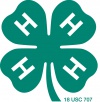4-H Can Be Your Child’s First Class at the University of New Hampshire
Did you know that your 5 – 18 year old child can be a part of the University of New Hampshire? When enroll in 4-H, your child joins hundreds of other kids across the state who learn, grow and have fun in this UNH Cooperative Extension youth program.
Your child will have fun learning a lot of different things in 4-H. They can have a blast building and launching a rocket or get stuck in the mud exploring a stream. They can raise animals and plants in the country or the city. They will have great times getting together with their friends, planning neat things to do in club meetings. They will have fun showing what they made and learned at the fair, or compete in public speaking and communication contests. Older members can apply for special trips, awards, and scholarships.
What is 4-H?
4-H is a part of the Cooperative Extension System which is operated through each state’s Land Grant University. It is the youth program of UNH Cooperative Extension. The mission of New Hampshire 4-H is to empower youth to reach their full potential working and learning in partnership with caring adults. Recent research has shown that 4-H is more likely than other youth programs to develop youth who are involved in their community as adults.
4-H Emblem
The emblem of 4-H is a four-leaf clover with an “H” in every leaf. The letters stand for HEAD, HEART, HANDS, and HEALTH; the foundations of all 4-H programs; Head-clearer thinking decision making, knowledge through life.; Heart-greater loyalty, strong personal values, positive self-concept, concern for others; Hands-larger service, workforce preparedness, useful skills, science and technology; Health-better living, healthy lifestyles. 4-H learning opportunities are intentionally designed around four essential elements for positive youth development by providing youth with: guided independence, a sense of belonging with a positive group, a spirit of generosity towards others, and a wide variety of opportunities to master life challenges.
4-H Philosophy
4-H Youth Development programs emphasize learning by doing. This experience encourages youth to experiment, innovate and think independently. 4-H leaders are encouraged to let youth experience and learn on their own. This process engages youth in the activity, encouraging them to think more, work harder, and ultimately learn more than with traditional methods.
4-H has three primary program areas: science, engineering, and technology; healthy living, and citizenship. 4-H projects are the special interest areas that members can explore within these program areas. 4-H programs are offered through community clubs, project clubs, after school groups, camp settings, and independently. Each individual program strives to promote the values of 4-H while providing youth with fun opportunities. Youth learn leadership, citizenship and life skills through the projects with topics as varied as rocketry, animal science, environment, wildlife, photography, nutrition, GPS mapping, and community service. 4-H is the only youth development program with direct access to the knowledge, research and technological advances from University Land Grant research.
4-H encourages youth to take responsibility and gives members the opportunity to make decisions. Youth can vote on activities their club participates in, sit on committees with adults, give their program direction, and help other 4-H members as a junior leader.
Youth who participate in 4-H are practicing the skills that they need to be successful, contributing adults. The skills that they master and apply to other situations in their life will serve them well in college, the work force, and as future decision makers of our society.
4-H Membership
4-H offers a wide variety of opportunity for all youth between the ages of 5-18. Cloverbuds are ages 5-7, juniors are ages 8-13, and seniors are ages 14-18. The 4-H program is open to all interested youth. Adults are welcomed as volunteers, supporters and helpers. Expectations for 4-H membership are a balance between 4-H project work, involvement in their local 4-H groups or clubs, participation in 4-H activities and events, and working towards improving one’s personal growth. You can enroll in 4-H anytime, but September and October start the 4-H year.
You can Become a 4-H Leader and Change Lives
4-H volunteers are vital to the success of the program, and we are always looking for adult volunteers. Volunteers continue to learn and stay enthused about their important role in helping youth develop their potential. Volunteers are encouraged to attend training sessions on a variety of youth development and subject matter topics. They are also encouraged to develop their potential through workshops, meetings, and conferences.
If you are interested in leading a project-based club, you can share your expertise to provide young people with learning opportunities as varied as agricultural science, rocketry, public speaking, photography, community service, healthy living, foods and nutrition, and so much more. Using research-based project curriculum you will have the resources to learn as you teach. In addition, you will have the support of your local 4-H Office. With a variety of flexible options, you can decide your level of involvement based on your skills and the amount of time you have available. Other volunteer opportunities include: 4-H Council, 4-H activities, promotional, fund raising, Superintendent/ Assistants and judges.
